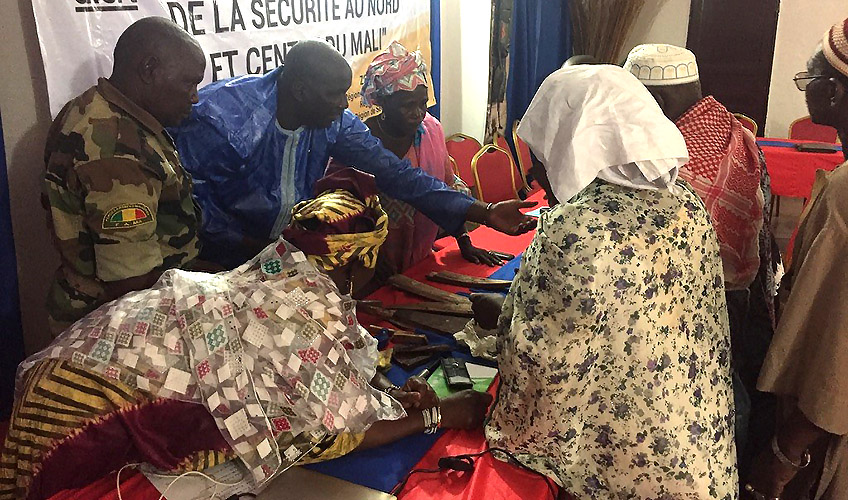Strengthening security governance in Mali
Mali has suffered eight years of insecurity and violence due to fighting between secessionist and Islamist militant groups and the central government, which in turn has left a security vacuum in which longstanding and deep-rooted intercommunity conflicts have worsened.

During this time, trust in the state has been hugely undermined by a combination of neglect and accusations of extrajudicial killings, kidnappings, torture and arbitrary arrests of suspected jihadists by both the national security forces and ethnic ‘self-defence groups’. This has exacerbated fear and suspicion within and across communities, with deep divisions along ethnic lines.
Since 2016, together with our national partner the Association Malienne pour la Survie au Sahel (AMSS), International Alert Mali has supported an initiative to improve trust and strengthen accountability among communities, local authorities and the security and defence forces (SDF) in the northern and central regions of Mopti, Segou and Timbuktu.
Our aim is to develop sustainable, locally owned strategies for tackling and reducing violent conflict and instability, through a combination of dialogue, training and the support of grassroots peacebuilding initiatives.
As of the end of 2019, we had helped set up and accompanied 25 community dialogue forums – 20 local and five regional – that had run a total of 215 dialogue sessions (attended by 6,740 people: 37% women, 63% men). We had run 18 training sessions (attended by 767 people: 34% women, 66% men) on topics including conflict analysis, conflict and gender sensitivity, women’s empowerment, peacebuilding methods and advocacy. And we had accompanied and financially supported 24 locally led peacebuilding initiatives.
Those involved in the programme and other community members have reported a reduction in the number of conflicts within and between communities, and between communities and the state. They have also observed increased collaboration in conflict resolution between community members and the SDF, and higher perceptions of safety among local populations.
“The security situation is better than last year due to the good relationship created between the SDF and the population thanks to the project,” said one beneficiary. Another person reflected that “the new FAMA [the national army] troops who are not imbued with the project activities do not interact with communities like those who benefited from the project.” These comments highlight both an achievement of the programme and the need for further support.
A significant outcome for the programme has been the acceptance of female mediators in communities where women typically have little or no role in decision-making. In one instance in 2018 in Borem-Inaly, in the Timbuktu region, a local women’s dialogue forum that received training and funding went on to successfully mediate a peaceful resolution to a long-standing dispute between two male leaders over who should be entitled to the traditional village chiefdom.
The fact that the women felt empowered to take on the responsibility to resolve the issue, as well as that the leaders in the community afforded them the space to do so in a traditionally conservative and male-dominated society, is a sign that our dialogue initiatives have helped transform perceptions not just on how conflicts should be resolved, but also on who should be involved in the process.
“It is the very first time in the history of our town or even the Timbuktu cercle [an administrative level below the region] that women are involved in problems that traditionally are always managed by men,” said one of the women mediators.
Communities benefiting from the dialogue forums have also seen traditional and religious leaders, many of whom had lost their influence and credibility due to the spiralling violence, re-engage and resume their roles as local peacebuilders, while other members of society have begun to play a more active role in municipal activities.
We have since been building on these successes and innovating further, including creating women only dialogue forums at the regional level.
This programme, which is made up of four projects, has been funded by the Canadian government through Global Affairs Canada, the Ministry of Foreign Affairs of the Netherlands, the UN Interregional Crime and Justice Research Institute (UNICRI) and the UN Multidimensional Integrated Stabilization Mission in Mali (MINUSMA).






